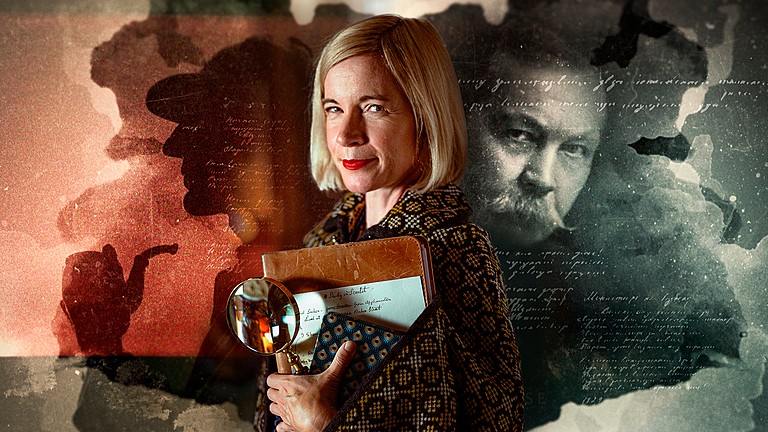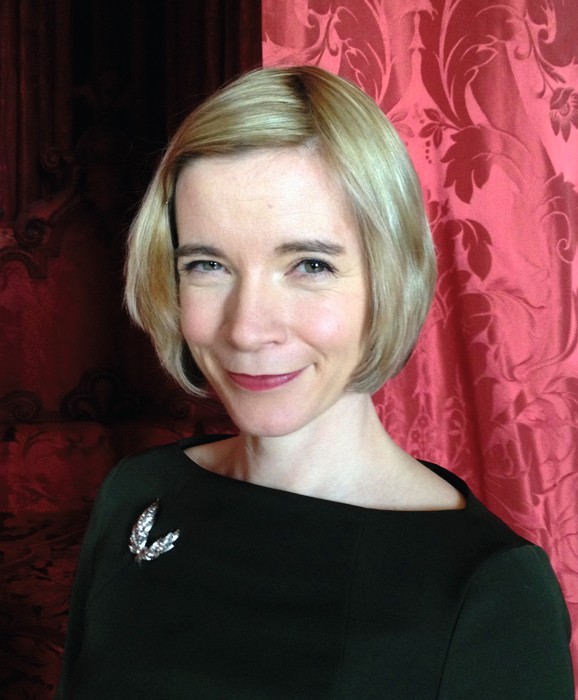The love-hate relationship between Sherlock Holmes and his creator: "Conan Doyle felt upstaged by Holmes"
Historian Lucy Worsley talks to Jonathan Wright about her new BBC Two series exploring the story of Sherlock Holmes and his creator, Arthur Conan Doyle

Look at a photograph of Sir Arthur Conan Doyle (1859–1930) and you seem to be looking at a stolid gentleman. He was, after all, a physician whose peak years straddled the Victorian and Edwardian eras. But read his Sherlock Holmes stories and a different picture emerges, of a man with a vivid, ingenious and macabre imagination.
Discussing her new series for BBC Two – Killing Sherlock: Lucy Worsley On The Case Of Conan Doyle – historian Lucy Worsley tells us about Conan Doyle’s contradictions – and about her affection for his most famous creation.
“I hope that if people watch our show, they might be inspired to pick up a book of Sherlock Holmes stories, to turn the pages, and to be transported back to the foggy London of the 1890s with a new sense of its social context and what it all means,” she says. “Literature is a fabulous means of time travel!”
When did you first encounter Sherlock Holmes?
I have had a lifelong, huge and weird crush on Sherlock Holmes. I remember sneaking The Hound Of The Baskervilles into my school bag because I wanted to finish it illicitly. I’m drawn to him for various reasons that don’t reflect particularly well on me, I think – he’s a loner, he’s obsessed with his work and he’s quite selfish. But when he’s on a case he cares passionately, which redeems him. And also I think that if the lovely Dr Watson loves Mr Holmes, and he very clearly does, then Holmes must at heart be a loveable person.
How did Arthur Conan Doyle come up with Sherlock Holmes?
Arthur Conan Doyle studied medicine, where all kinds of interesting scientific advances were being made in the later 19th century. In particular, Conan Doyle studied with the famous Dr Joseph Bell [1837–1911, a surgeon who lectured at the University of Edinburgh], who could work out what was wrong with people by minutely analysing every detail of their body and symptoms.
You can see Holmes doing the same thing, with his clients and with suspects. He has an almost superhuman power of understanding the real truth, which turns out to be based on highly focused observation.
More like this
Sherlock Holmes wasn’t an instant success until suddenly he was. What factors came together?
Arthur Conan Doyle initially tried to publish Sherlock Holmes in the kind of highbrow magazines he longed to appear in, such as The Cornhill. But it turned out Holmes was much more suited to this fantastic new mid-market magazine, The Strand.
This was very often read by commuters working in the throbbing, busy, foggy London of the late 19th century, which the fictional Holmes was keeping safe for people just like them. It’s no accident that a Sherlock Holmes story could be finished in the time it took your train to get home!
It’s no accident that a Sherlock Holmes story could be finished in the time it took your train to get home
Arthur Conan Doyle was at best ambivalent about Holmes. Why was this?
Conan Doyle was an intellectual snob. He wanted prestige and respectability and to join all the poshest clubs. Yet, at the same time, he wanted money. So he was deeply ambivalent about his ambitions. He wanted to be highbrow and rich, but he couldn’t quite have both. So he chose being rich.
Why did Conan Doyle kill off and then bring back Holmes?
Conan Doyle felt upstaged by Holmes, so he had Holmes fall to his death over the Reichenbach Falls in Switzerland. Ten years on, though, Conan Doyle just couldn’t resist the enormous sums of money he was offered to bring Holmes back to life. Given his own life goal of being a highbrow writer, he must have felt a bit dirty about this. But I think it’s a shame he couldn’t take pride in his own creation!
Conan Doyle just couldn’t resist the enormous sums of money he was offered to bring Holmes back to life
Why did Conan Doyle so crave respectability and security?
Dark family secrets were endemic to the Doyles. Conan Doyle’s grand London friends had no idea that for many years his alcoholic father [artist Charles Altamont Doyle, 1832–93] was confined to an asylum, that his mother had taken up with a younger man, and that he himself had a wife and a relationship with a much younger opera singer as well.
Add in the financial precarity of Doyle’s childhood, and you get a very powerful motivation for plugging away with his writing until it became a wild success. His energy and determination were as important as his talent.
Was Conan Doyle in some sense in denial of a part of himself?
There was always a suppressed longing in him for the unknown, for things that can’t be explained by the rational, scientific mind of Sherlock Holmes. Later in life, he became a fully paid-up member of the spiritualist movement: he believed in life after death, he consulted mediums in the hope of communicating again with his son, lost just before the end of the Great War.
But if you think about Sherlock Holmes back in the 1880s, he seems on the surface to be this cold, calculating machine of a man, yet he also has the purpose of making people feel better. He consoles them, he solves their problems: he provides the kind of reassurance and authority that a medium does. The rational and the mystical were present in Conan Doyle in equal measure.
How important is the case of George Edalji [1876–1953, a solicitor of Indian descent who was wrongly convicted on a charge of injuring a pony] in understanding Conan Doyle – and does it shed light on Holmes?
The case of George Edalji shows Conan Doyle really embracing – for once – the fact that the wider public often confused him with the fictional character he’d created. He ‘investigated’ the case and published articles about it, and lobbied police and government, just as Holmes would have done.
The campaign Conan Doyle led helped to get the Court of Appeal set up, to deal with miscarriages of justice. It was one of the great achievements of Conan Doyle’s life, I think.
Killing Sherlock: Lucy Worsley On The Case Of Conan Doyle started on BBC Two on Sunday 10 December. Find out more about the series
Authors

Lucy Worsley is a historian, author and broadcaster, and is also joint Chief Curator at Historic Royal Palaces. A familiar face on British TV screens, she has presented a host of history programmes including Royal History’s Biggest Fibs, Blitz Spirit with Lucy Worsley, Suffragettes with Lucy Worsley and Victoria & Albert: The Royal Wedding.

Start the year with a subscription to BBC History Magazine - £5 for your first 5 issues!
As a print subscriber you also get FREE membership to HistoryExtra.com worth £34.99 + 50% London Art Fair 2024 Tickets




